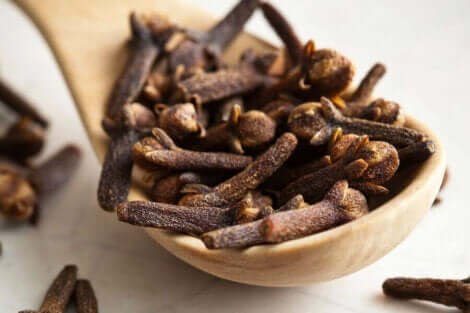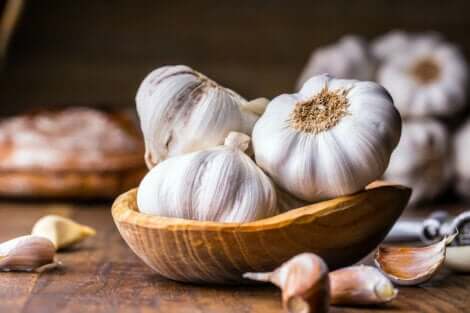Eight Natural Fly Repellents to Make at Home


Written and verified by the doctor Nelton Abdon Ramos Rojas
Is the buzzing of flies keeping you awake at night? If so, you’ll know how extremely irritating it is to have these flying insects circling around you. What you must do is stop making your home a space they like. Flies feed off food scraps and excrement. So, if you leave a feast in front of them, they’ll never go away.
Indeed, if you leave dirty dishes in the sink, have overflowing trash, and don’t clean your pets’ waste in a timely manner, it’ll be extremely hard to get rid of flies. In fact, if you don’t keep your home clean, these natural fly repellents won’t work.
However, as unpleasant as it is to think of, flies are part of the food chain and they’re responsible for eating animal carcasses. We just need to keep them in their place and not in our homes.
Natural fly repellents
We must make it clear that there’s no evidence that these natural fly repellents are effective. That’s because they’re old-fashioned and traditional remedies that may work in some cases but not in others.
However, they’re alternatives to chemical insecticides that are often harmful. In fact, although many don’t know it, these products have a negative impact on our health and environment.
A study published in the journal Cogent Medicine confirms that the toxic substances in commercial products can cause:
- Neurological symptoms, like headache and dizziness.
- Respiratory difficulties, including pain and irritation and dyspnea of the upper respiratory tract.
- Gastrointestinal discomfort, such as nausea and vomiting.
Even though there are reports of just a few cases of diseases pertaining to the use of household insecticides, the general recommendations are to either moderate or avoid their use. Therefore, when it comes to getting rid of flies, try some of these traditional remedies made with natural ingredients before using harsh chemicals.
1. Cloves and lemon
This spice does more than just give your food a special flavor and aroma. In fact, if you combine it with lemon, you get one of the best natural fly repellents for your home.

Ingredients
- 1 lemon.
- 12 cloves.
Instructions
- Cut the lemon in half.
- Stick the cloves into it to cover the whole surface.
- Repeat with the other half.
- Place them in the corners of your rooms or by the windows.
The fragrance they give off repels flies. If you like, you can repeat the process as many times as you want and put lemons all over your house to keep them away.
We also recommend reading: 11 Herbs That Naturally Repel Mosquitoes
2. Lavender is one of the best natural fly repellents
When it comes to useful household herbs, lavender definitely comes near the top of the list. It doesn’t just smell wonderful but, according to tradition, it repels flies and even mosquitoes.
- You can use an infusion, a lavender plant, or just buy bunches of this herb and place them around your house.
3. A bag filled with water and vodka
This trick has become popular in recent years. All you have to do is fill a ziplock bag with water and vodka and hang it outside your house in the doorways and windows.
- How does it work? Sunlight reflects off the water and keeps flies from coming in. Plus, flies hate the smell of vodka.
4. Vinegar
When it comes to household chores, vinegar is one of the most popular ingredients. To repel flies, mix it with a little dishwashing soap.

Ingredients
- 1/2 glass of vinegar (100 ml).
- 10 drops of liquid soap.
Instructions
- Heat the vinegar to accentuate its smell.
- Pour it into a container.
- Add the 10 drops of liquid soap and stir until it’s homogeneous.
- Place it wherever there are flies and you’ll see how they end up in the container.
You might also like to read: Science-Backed Properties of Apple Cider Vinegar
5. Mint
It’s said that flies flee from the smell of mint plants. Therefore, all you have to do is make the following mint-based ‘perfume’ to keep them away.
Ingredients
- 1 small jar.
- 1 sponge.
- 20 drops of mint essential oil.
- 1/2 cup of water (125 ml).
Instructions
- Put the sponge in the jar and soak it with a little water.
- Add the mint oil and put the lid on the jar.
- Let the mixture stand for a day.
- Remove the lid and let the fragrance spread to keep the flies away.
- Use the solution for as long as its fragrance lasts.
6. Garlic
Garlic is one of the most widely used herbs in homes. Although its flavor and aroma are delicious in food, it’s said to be unpleasant for flies.
- You can keep them away by spraying garlic oil in your home or just putting it in containers in places where you tend to see flies.

7. Cucumber
Cucumber seems to be another effective ingredient that wards off flies in the home. Again, it’s said they don’t like its smell.
- Slice a cucumber and place the slices around your home where flies tend to congregate. You might want to place them by the trash can, in corners, or close to your dining table.
- Try this for a week and you’ll see how the number of flies reduces.
8. Basil
The repellent activity of the essential oil of basil (Ocimum micranthum) is similar to that of a chemical repellent. It also has the advantage of biodegradability, no environmental pollution, and low production cost.
Research has highlighted certain plants with the greatest repellent capacity for houseflies. In fact, in an exhaustive study, in which the insecticidal power of 30 essential oils was measured, four bioproducts stood out for their powerful repellent action. They were the essential oils of peperina (Minthostachyus verticillata), sweet orange (Citrus sinensis), bitter orange (Citrus aurantium), and Eucalyptus cinerea, a variety of eucalyptus.
The oils, mixed with isopropyl alcohol were sprayed in a room. They were found to have an effectiveness of more than 70 percent as a fly repellent.
Research showed that when different oils are combined, it enhances their activity. For example, the essential oils of sweet orange and bitter orange peel “showed 70 percent efficacy in killing flies in a room, after 60 minutes of spraying”.
Are you trying to repel flies in your home?
As you can see, these repellents are easy to prepare and contain safe ingredients. In addition, unlike chemical insecticides, they don’t have a negative impact on your health and the environment.
Therefore, you can use them whenever you need them in any area of your home. Their continual use won’t cause allergies or contamination. Of course, you must keep in mind that they won’t be as aggressive as commercial products, so you might not always get the desired results.
All cited sources were thoroughly reviewed by our team to ensure their quality, reliability, currency, and validity. The bibliography of this article was considered reliable and of academic or scientific accuracy.
- Bertoni, A. O. (2013). Insecticida natural para el control de Musca doméstica en base a aceites esenciales y sus componentes [Tesis Doctoral, Universidad Católica de Córdoba]. UCC Sistema de Bibliotecas. https://pa.bibdigital.ucc.edu.ar/75/
- Boito, J. P., Da Silva, A. S., dos Reis, J. H., Santos, D. S., Gebert, R. R., Biazus, A. H., Santos, R. C. V., Quatrim, P. M., Ourique, A. F., Boligon, A. A., Baretta, D., Baldissera, M. D., Stefani, L. M., & Machado, G. (2018). Efecto insecticida y repelente del aceite de canela sobre moscas asociadas con el ganado. Revista MVZ Córdoba, 23(2), 6628-6636. https://revistamvz.unicordoba.edu.co/article/view/1337
- Khan, J., Khan, I., Qahar, A., Salman, M., Ali, F., Salman, M., Ali, F., Salman, M., Khan, K., Hussain, F., & Abbasi, A. (2017). Efficacy of citronella and eucalyptus oils against Musca domestica, Cimex lectularius and Pediculus humanus. Asian Pacific Journal of Tropical Disease, 7(11), 691-695. https://www.researchgate.net/publication/320587546_Effiacy_of_citronella_and_eucalyptus_oils_against_Musca_domestica_Cimex_lectularius_and_Pediculus_humanus
- Sarwar, M. (2016). Indoor risks of pesticide uses are significantly linked to hazards of the family members. Cogent Medicine, 3(1), 1155373. https://www.tandfonline.com/doi/full/10.1080/2331205X.2016.1155373
- Senthoorraja, R., Subaharan, K., Manjunath, S., Pragadheesh, V. S., Bakthavatsalam, N., Mohan, M. G., Senthil-Nathan, S., & Basavarajappa, S. (2021). Electrophysiological, behavioural and biochemical effect of Ocimum basilicum oil and its constituents methyl chavicol and linalool on Musca domestica L. Environmental Science and Pollution Research International, 28(36), 50565-50578. https://www.ncbi.nlm.nih.gov/pmc/articles/PMC8105153/
- Zhu, J. J., Cermak, S. C., Kenar, J. A., Brewer, G., Haynes, K. F., Boxler, D., Baker, P. D., Wang, D., Wang, C., Li, A. Y., Xue, R. D., Shen, Y., Wang, F., Agramonte, N. M., Bernier, U. R., de Oliveira Filho, J. G., Borges, L. M. F., Friesen, K., & Taylor, D. B. (2018). Better than DEET Repellent Compounds Derived from Coconut Oil. Scientific Reports, 8(1), 1-12. https://www.ncbi.nlm.nih.gov/pmc/articles/PMC6145915/
- Zhu, J., Zeng, X., Berkebile, D., Du, H., Tong, Y., & Qian, K. (2009). Efficacy and safety of catnip (Nepeta cataria) as a novel filth fly repellent. Medical and Veterinary Entomology, 23(3), 209-216. https://www.ars.usda.gov/research/publications/publication/?seqNo115=232664
This text is provided for informational purposes only and does not replace consultation with a professional. If in doubt, consult your specialist.








